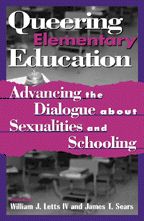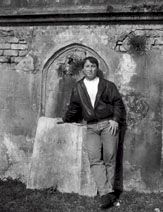 |


|
|
Queering Elementary Education: Advancing the Dialogue about Sexualities and Schooling, Edited by William J. Letts IV and James T. Sears, Rowman & Littlefield Publishers, Inc., 1999, 291 pages,  Probably no other title in the pantheon of liberationist literature will evoke more controversy
than Queering Elementary Education. If there was an unseemly uproar over Daddy's Roommate and Heather Has Two Mommies, just wait till the Religious Reich spies this august tome on some thoughtful teacher's shelf.
Probably no other title in the pantheon of liberationist literature will evoke more controversy
than Queering Elementary Education. If there was an unseemly uproar over Daddy's Roommate and Heather Has Two Mommies, just wait till the Religious Reich spies this august tome on some thoughtful teacher's shelf.
Its editors, both educators, have provided what some see as a companion volume to the award-winning film, It's Elementary. They take it for granted that children in the earliest grades have already been introduced—through schoolyard and media—to the concept of same sex love and affection, that most remain confused about it and that it is best to begin demystification processes early in life rather than allowing mistaken perceptions to take root. It's Elementary's producer, Debra Chasnof, exults: "What a relief to finally have such a thoughtful collection of essays and research to back up what we've found in schools across the nation…an examination of the ways children's lives are hurt by homophobia and an inspiring array of strategies educators can use to turn this problem around." The revealing and heart wrenching personal experiences of gay and lesbian youths— who, because of homophobic social pressure now comprise at least one third of all youth suicides--are chronicled in Queering Elementary Education along with incisive commentaries by educators themselves. One of the book's two editors, James T. Sears, Ph.D., points out that it is "not about teaching sex. It's for teachers and parents who choose to model honesty, civility, authenticity, integrity, fairness and respect."
Only a few years later, as I recalled the intense pain that had been caused by that period of adolescent confusion, my earliest gay liberationist exploits were thereby maximally fueled. I was determined to challenge a corrupt educational system that had allowed me, without caring, to waltz on the edge of self-destruction. And I wanted to do everything possible to assure that no other youngsters would experience a similar hell of such deep-going unhappiness. Queering Elementary Education is the first carefully constructed work written for educators who are ever on the front lines in the worldwide struggle to eliminate prejudices born of societal ignorance. It opens with a poignant poem, "Matthew's Lullaby," a tribute to Matthew Shepard, by Perry Brass. The poem speaks of finding a safe haven, home turf where "people who will love me as theirs," abound. This extraordinary book was conceived in the summer of 1997 when its editors envisioned what one of them, William J. Letts, IV called: "a project that would take into account the lifeworlds of children, their families, their teachers, and their schools." Letts says: "We wanted to challenge several orthodoxies about the education of small children, but to do so in ways that connected with peoples lives and experiences. We hoped to create a text that would link the best of theoretical thinking with perspectives from practice." The editors, in this reviewer's estimation, have succeeded admirably in their mission.
"Rather than focussing on reducing such prejudices, shouldn't we consider how not to instill, foster, or intensify these prejudices in the first place?" he asks. Queering Elementary Education begins with "Foundational Issues" answering queries such as "Why Discuss Sexuality in Elementary School?". The book's second section deals with children's sexual and social development, including supposed effects of being taught by openly gay teachers. Part three looks at possible curriculums, examining and critiquing the "heteronormative nature of elementary school science." Part four deals with family ties while the final section examines educators and their allies. Fortunately, the publisher of Queering Elementary Education maintains offices at Oxford. British educators and politicians would thus do well to study this groundbreaking work with care. Currently, in both Scotland and England, intense and bitter controversies have erupted over the intent of progressives to introduce just such reforms as this book suggests. Hoping to scrap a homophobic conservative law—Section 28-- forbidding "the promotion of homosexuality in schools," they find that British media continues to use prejudicial Section 28 language about "promoting homosexuality" and thereby stirs a frantic opposition to change. Deborah Epstein, at the University of London, offers this following recommendation: "Queering Elementary Education is a groundbreaking book. Here we have, for the first time, a wide-ranging collection of articles on sexuality and elementary (or, in British terms, primary) schooling. Together and individually, the chapters of this book make a compelling case for Queering Elementary Education to the benefit of all children in their diversity…a rich resource for teachers, student teachers and teacher educators." It is also a book, as Ms. Epstein notes, for anyone with an interest in sexuality, social justice, and schooling. |
 © 1997-2000 BEI
© 1997-2000 BEI
 Dr. James T. Sears
Dr. James T. Sears